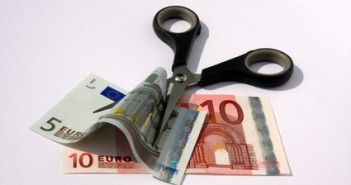Up to now, Cyprus was defined a “special case” and that justified taxing bank depositors. A fresh comment from the head of the Eurogroup shows that this model could be copied elsewhere.
His comment hurt some bank stocks across Europe and also hurt the euro a bit further. Is the Cypriot situation snowballing?
Update: EUR/USD is now at 1.2840 after reaching a new bottom of 1.2830. This is a new 2013 low.
Update 2: Dijsselbloem states that he never said that Cyprus would be a template. He gave an interview to the Financial Times and Reuters, explaining very clearly what the new regime is, and why the markets should like it. Apparently the markets didn’t like it and the comments were “clarified”. The euro is recovering, but is seems like a dead cat bounce.
In Cyprus, the banking system was huge, with a lot of money from abroad, especially from Russia. The average German taxpayer did not want to show solidarity with money a model that France’s finance minister called “a casino economy”.
So, big bank accounts of over 100K can be taxed, as this isn’t a poor Cypriot’s savings. The initial proposal was to tax all the bank accounts, at different levels. Luckily, this offer was rejected and accounts of under 100K will remain protected, according to the rules.
This was Eurogroup head and Dutch finance minister Jeroen Dijsselbloem had to say:
“If there is a risk in a bank, our first question should be ‘Okay, what are you in the bank going to do about that? What can you do to recapitalise yourself?’. If the bank can’t do it, then we’ll talk to the shareholders and the bondholders, we’ll ask them to contribute in recapitalising the bank, and if necessary the uninsured deposit holders,”
So, this is not necessarily limited to Cyprus. Holders of large accounts at European banks have more to fear about.
His words certainly make sense in the larger scheme of things: Irish taxpayers helped bail out some Irish banks, while uninsured deposits were left untouched.
It’s just that the timing of his words will make some Europeans a bit less comfortable.
EUR/USD already fell on comments from the chairman of the Cypriot finance committee in parliament who said that “the benefits of a euro-exit should be assessed.”
The pair is now trading at 1.2857, after already falling to 1.2847, only 4 pips above the 2013 low of 1.2843. Further support is at 1.2805.
Further reading: EURUSD Could Fall Much Lower In 2013 (Elliott Wave Analysis)
